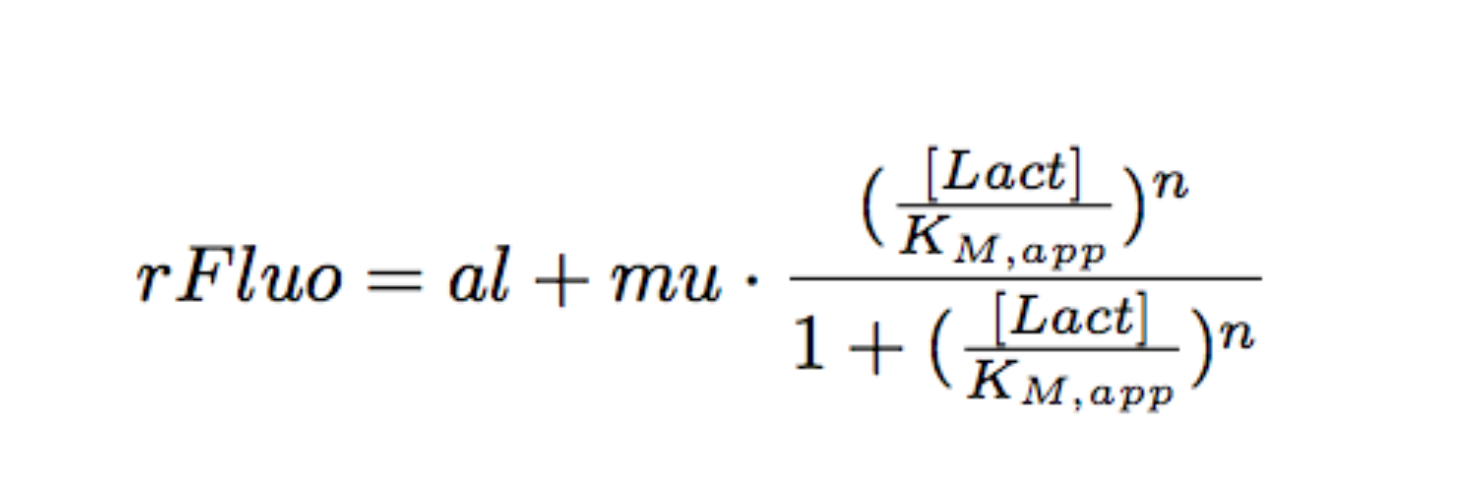Part:BBa_K822000:Experience
This experience page is provided so that any user may enter their experience using this part.
Please enter
how you used this part and how it worked out.
Applications of BBa_K822000
Characterization by ETH Zurich 2015 iGEM team
Experimental Set-Up
Genetic design
To characterize the natural lldR promoter we designed a plasmid containing the aforementioned promoter with sfGFP in a medium copy plasmid and transformed it into Escherichia coli TOP10. Then, we added a second plasmid containing lldR Part:BBa_K1847001 with a medium strong promoter (Part:BBa_J23118) and a strong RBS (Part:BBa_B0034). According to literature, LldR will repress the promoter and by the addition of lactate the production of GFP will start, as the repressor will be removed.
For continuing with the characterization, we replaced lldR for lldP-lldR Part:BBa_K1847016. LldP is a pump that allows the entrance of L-lactate inside the cell. We tried two different promoters to activate this operon. For the first one we used Part:BBa_J23118, which is a medium strong promoter, while for the second promoter we used Part:BBa_J23114, a weak promoter. <p>
Plate reader
E. coli TOP10 strains were grown overnight in Lysogeny Broth (LB) containing kanamycin (1 µg/mL) and chloramphenicol (0.36 µg/mL) at 37°C and 200 rpm. Cultures were diluted 1:50 in fresh LB with the corresponding antibiotic and transferred to a 96-well plate (200 µL/well). Cultures were grown for 90 min to arrive to exponential phase and then different concentrations of lactate were added. Samples were always made in triplicates and a blank of LB with the corresponding lactate concentration was done. During 7 h the absorbance at OD600 and fluorescence (excitation 488 nm and emission 530 nm) were measured with intervals of 7 min. The plate was always kept at 37°C. We calculated dose-response curves from the exponential phase of the bacteria using normalized fluorescence divided by OD.
Modeling
Each experimental data set was fitted to a Hill function using the Least Absolute Residual method (Fitting Toolbox in MatLab).
Where:
- al: leakiness in µM/min
- mu: constant in µM/min
- KM: half-maximum effective concentration (a representation of sensitivity) in µM
- n: Hill coefficient (a representation of cooperativity), unitless
| J23118-B0034-lldR | J23118-B0034-lldP-lldR | J23114-B0032-lldP-lldR | |
|---|---|---|---|
| Coefficient values | KM=955 (841, 1069) | KM=1930 (-1005, 4866) | KM</sub=761.3 (138.2, 1384) |
| al = 462.5 (174.1, 751) | al = 757.7 (-1364, 2879) | al = 3823 (2616, 5029) | |
| mu = 4798 (4432, 5163) | mu = 6092 (2066, 1.012e+04) | mu = 4956 (3678, 6234) | |
| n1 = 1.386 (1.156, 1.615) | n1 = 0.6999 (-0.08721, 1.487) | n1 = 1.5 (fixed at bound) | |
| Goodness to fit | sse: 7.8698e+06 | sse: 5.8453e+08 | sse: 8.0947e+08 |
| rsquare: 0.9977 | rsquare: 0.9193 | rsquare: 0.9200 | |
| fe: 7 | dfe: 7 | dfe: 8 | |
| adjrsquare: 0.9967 | adjrsquare: 0.8848 | adjrsquare: 0.9000 | |
| rmse: 1.0603e+03 | rmse: 9.1380e+03 | rmse: 1.0059e+04A |
As can be seen in the picture above, when PlldR GFP is alone, the fluorescence levels do not vary with lactate concentration. However, if PlldR GFP is expressed in a system with constitutive expression of LldR, at low concentrations of lactate there is repression of the promoter, while at high concentrations there is activation. Activation is higher when there is constitutive expression of LldP-LldR.
Improvement of the wild-type promoter
We designed and tested other promoters based on the wild-type PlldR to compare them and make a library of promoters. We removed the ArcA binding site to avoid interference. Our Part:BBa_K1847008 has a higher ON/OFF ratio than the natural promoter (15.26 vs 10.35). Moreover, the addition of the part with LldP-LldR (Part:BBa_K1847016) triggers the sensitivity of the promoter.
In the following table, one can see the ON/OFF ratios and the KM of the wild-type promoter and the three more prominent members of the library.
Table 1: ON/OFF ratio
| LldR | Additional LldP | |||
|---|---|---|---|---|
| J23118-B0034-lldR | J23118-B0034-lldP-lldR | J23114-B0032-lldP-lldR | ||
| Part:BBa_K822000 (wild-type) | 10.35 | 8.04 | 1.16 | |
| Part:BBa_K1847008 | 15.26 | 23.96 | 1.42 | Increasing promoter strength |
| Part:BBa_K1847009 | 2.5 | 24.34 | 0.96 | |
| Part:BBa_K1847007 | 2.15 | 3.85 | 1.29 | |
Table 2: KM (µM)
| J23118-B0034-lldR | J23118-B0034-lldP-lldR | J23114-B0032-lldP-lldR | |
|---|---|---|---|
| Part:BBa_K822000 (wild-type) | 955 | 1930 | 720.2 |
| Part:BBa_K1847008 | 1075 | 1751 | 337.5 |
| Part:BBa_K1847009 | 977.5 | 2361 | 459.8 |
| Part:BBa_K1847007 | 697.7 | 1977 | 1337 |
User Reviews
UNIQcd80b66215228abf-partinfo-00000000-QINU UNIQcd80b66215228abf-partinfo-00000001-QINU


